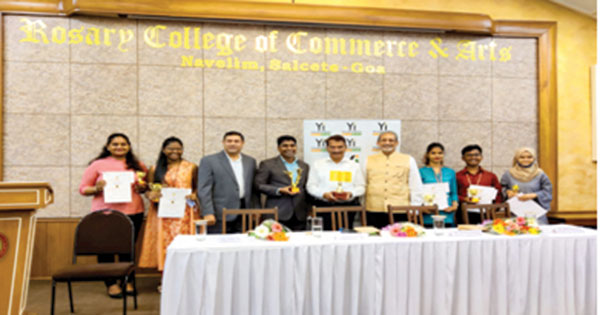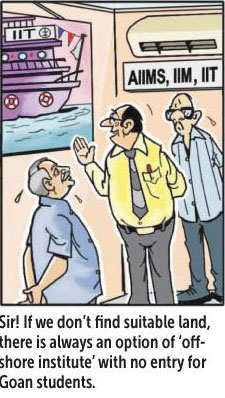
We have reached the last leg of the NEP series, the first article attempted to deal with the ‘WHY’ part of the policy with focus on inherent goals and associated challenges in NEP 2020, the second article highlighted the ‘WHAT’ aspect by making the underlying constructs, models, hypothesis visible while the third article suggested time tested strategies, execution layout interventions to be applied for such large scale green field project using the Organisation development theory, design and practices.
This article will exclusively deal on the way forward through purposeful research based CSR.
We all know that one of the major challenges in the implementation of any policy is the absence of relevant institutional mechanisms, transition support and adequate funding.
Concerns about institutionalised inertia and indifference can also adversely impact the implementation of National Education Policy-2020.
However if we visualise NEP 2020 through the lens of ‘CSR Incubator’ a construct designed and built by GDP Foundation and thoughtfully apply the same it will facilitate seamless transition towards NEP in spite of existing challenges, constraints and resistances, as the industry and business are the biggest beneficiaries of NEP 2020 and if they are wisely engaged, the way forward is almost like an express highway.
Business needs society and society needs business
Government, activists and media have become adept at holding businesses responsible for CSR thus making CSR inescapable priority for the companies.
With latest amendments in The Companies Act 2013 CSR initiatives, activities need to integrate sustainability with a long-term focus which actually serves on platter a perfect recipe for NEP 2020 transition and at the same time it helps industry to leverage their CSR fruitfully and avoid penalties.
Since NEP envisages on building life skills and employability competencies it assures quality talent to the industries leading to improvement in ROI and ROTI (Return on time invested).
Thus a well-planned, strategised CSR seems to be the reliable and sensible way forward for NEP 2020 transition and to understand this let us look at how we can Channelise CSR
1.
Snap shoot of CSR ecosystemin Goa
•
CSR in Goa has been largely traditional and seen as a philanthropic activity which is performed but not deliberated. As a result, there is limited documentation.•
It has contributed in institutional building (education, cultural) but it needs traction with larger participation and even spread including Research.•
CSR has also stuck with minimum 2% contribution mindset as laid in the policy.•
Felt needs of the society are not well assessed or factored.•
Absence of ground research& impact assessment.•
Low or no dedicated qualified staff for CSR.•
Most of the major/big industries/MNCs in Goa have their registered offices outside Goa, the CSR fund allocation may not be as per the Goa unit’s contribution to profitability.•
MSME (Micro Small and Medium) which is the biggest cluster does not have internal bandwidth or external platform to undertake CSR.2.
How can CSR fuel the NEP2020 way forward?
The answer is through ‘CSR – Incubator’
CSR incubator is a unique research based model designed, built and tested by GDP Foundation to facilitate both Large & SME’s (Small, Medium Enterprise) to contribute towards purposeful CSR.
GDP Foundation has required expertise, experience and track record in the domain of CSR consultancy; it incubates CSR projects, ideas, initiatives through a qualitative and quantitative research factoring felts needs both at micro and macro level thus creating a self-sustaining CSR at affordable investment.
CSR Incubator created two back to back block buster hits namely ‘Parivartan Karo Na’ and ‘Talking Talukas – Rural youth rising’
‘Parivartan Karo Na’ was a large scale community initiative which posed 5 challenging scenarios (life and livelihood) during Covid, the response was overwhelming more than 125 teams participated and 97 submitted their projects and in span of 3 months this initiative built 27 hi-potential social/tech start-ups.
‘Taking Talukas-Rural Youth Rising’ was designed to tap the potential of rural youth, this project was launched by Hon Dy CM Chandrakant (Babu) Kavlekar at Ravindra Bhavan – Margao on January 26, 2021 and was supported by CII, CII-Yi, BNI, Rotary Club of Miramar and SME from Kundaim Industrial Estate - Sandesh Dhareshwar. Six Talukas from South Goa were covered and 16 colleges participated; each cluster had 100 plus teams.
(Talking Talukas - launch at Ravindra Bhavan - Jan 26, 2021)
(Talking Talukas awards ceremony for Salcete Taluka at Rosary College)
3) How can Large scale industries contribute to NEP 2020 transition?
In our first article “NEP1” we had highlighted (refer point number 8) that one of the goals of NEP 2020 clearly stating to create ‘Shared resources-clusters’ which will connect 10-15 schools in the vicinity with an aim to reduce school isolation, efficient use of teaching learning resources, experiential simulated activities and increase governance and accountability.
Large industries can and should come forward to build such ‘Shared facilities’ especially in rural sector, one can even explore possibilities of creating mobile unit for the last mile coverage.
4) SMEs/Retail sector & NEP 2020 transition…a win-win proposition.
a) What are SMEs ?
SME’s are Small and medium enterprises classified into “Manufacturing Enterprises” and “Service Enterprises”, they are classified based on their turn over ranging from 25 lakhs to 250 crores and certain limit on people employed. They serve independently and also as an ancillary to larger units.
Goa has a dense network of MSMEs spread over 50 plus sectors.
b) Why SMEs play an important role ?
They employ more than 60 million people with diversified skills and contribute to more than 45% of Manufacturing output, 40 % of India’s export, has potential to create 1.3 million jobs every year and produces 8000 quality products for both Indian and International market.
c) How do they perform?
The business activities of SMEs are performed in the proximity of locals who are associated with the SMEs either as owners, employees and vendors.
d) SME alliances and NEP 2020?
SMEs are embedded in the core of the community and quite often they belong to the locals who are either alumnus or their children go the schools in the proximity or their relatives are employed in the schools, this gives them head start in understanding the pressing needs, felt needs of the community which is a prerequisite for building CSR programmes. They thus become natural partners for sponsoring NEP 2020.
e) Risk mitigation
NEP is a long term project and it will need continuity on funding, if we solely depend on large industries the major hindrance will be uncertainty of CSR budget as CSR fund is a function of the financial performance of that company and fluctuating performance impacts CSR fund allocation which in turn will jeopardise the NEP project, this risk needs to be mitigated.
f) Assured reach
Since SMEs are spread across the length and breadth of Goa, so are educational institutions hence by mapping and adoption method, we can ensure that each every school is under the SME CSR radar .
g) Benefits to SME
•
Reduced Operational costs for CSR•
Communities provide licence to operate•
Attract & retain talent•
Communities as suppliers•
Enhancing reputation•
Bonding and sense of purpose.•
Atmanirbhar & swayampurnaIndia is a country of myriad contradictions. On one hand, it has grown to be one of the largest economies in the world, and an increasingly important player in the emerging global order, on the other hand, it is still a home to the largest number of people living in absolute poverty (even if the proportion of poor people has decreased) and the largest number of undernourished children deprived of quality education.
Government should encourage/incentivise/reward industries/SMEs to sponsor NEP transition, it should cut red tapes. It should also reward schools who have taken initiative to transit to NEP 2020 without waiting for formal notification/order, etc. Government should also invite policy advocacy from schools/Trusts/consultants and build a customised NEP for Goa without compromising the core and essence.
GDP Foundation thanks Herald group for partnering this initiative and we hope they will continue do so as we advance, our gratitude to those who responded to the articles with valuable and insightful feedback is a testimony that together we can make Goa the role model state for its successful transition to NEP 2020.
We invite Government, Industries, Associations, Business houses, to reach out to us to reinvent their CSR and contribute towards the way forward for NEP 2020.
We also invite educational institutions, Directorate of Education/Higher Education and SCERT to engage and explore the state of art tools and techniques we have created to facilitate seamless and successful transition to NEP 2020.
References:
1) Hand book on CSR in India – PWC -CII
2) NEP 2020 manual
3) 364 days of Transformation book
This article is compiled by
Kishore Shah -Managing Trustee: GDP Foundation
Shivram Krishnan – Director : GDP Foundation
Col. Sukhaman Singh (Retd) -Deputy Director : GDP Foundation www.gdpideaz.org
Email –[email protected]/[email protected]
